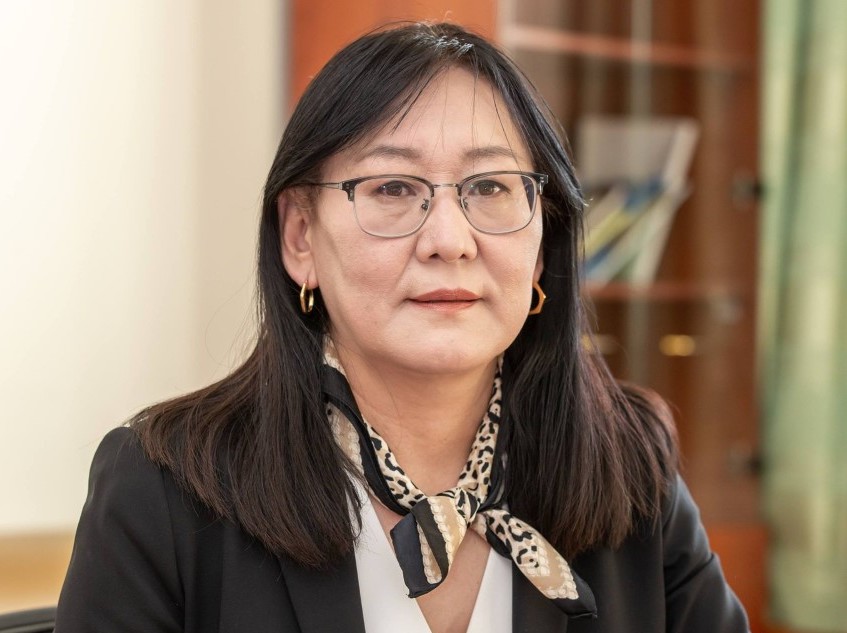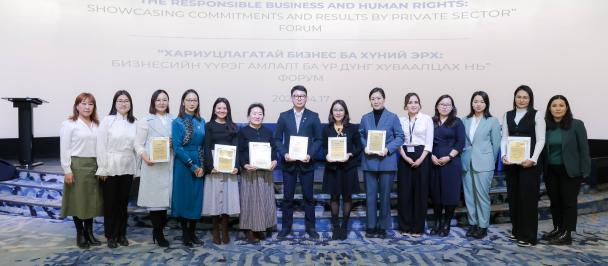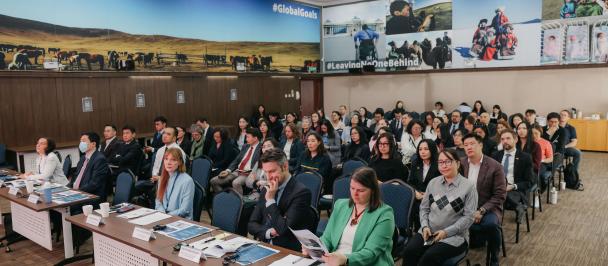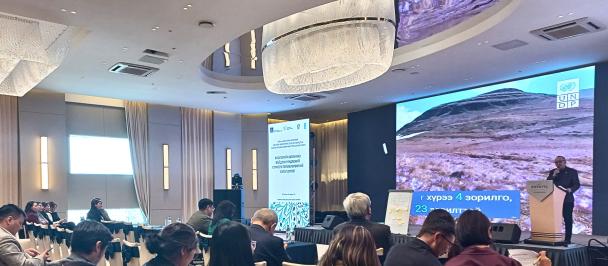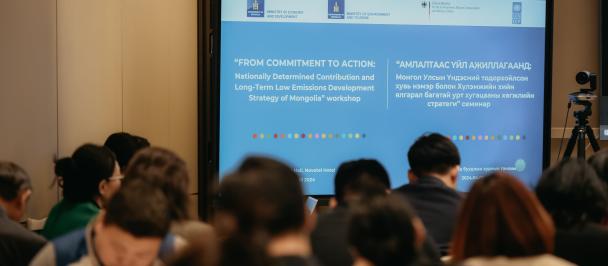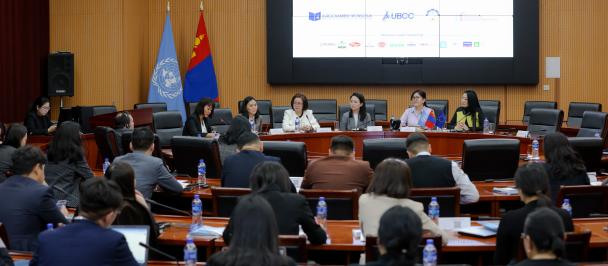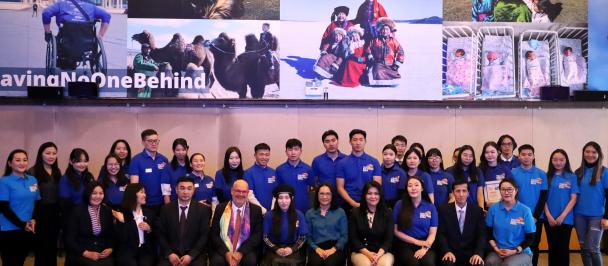Ms.Sh.Munkhtseren, Head of the Cabinet Secretariat Department.
“You are destined to have a child with disabilities because you are strong.”
“My son changed my view of the world. It is painful for a mother to see her child being discriminated against. Possibly, all parents of children with disabilities go through this journey. Many of these parents appear to be provocative. They fight in every way to raise and nurture their children, but their efforts are less than effective when it comes to social life. Therefore, I realized that we need to change the attitude of the whole society” said Sh. Munkhtseren. She is a mother of four and a hard-working civil servant. She gave birth to her youngest son 16 years ago.
Until recently, many parents in Mongolia were hesitant to engage their children with disabilities with the public. Sadly, a tendency to discriminate these children from birth remains. When I gave birth, the neonatologist informed me about my son’s Down syndrome diagnosis in a harsh and non-appropriate manner.
While we were waiting with other mothers and their babies to be discharged from the hospital, the doctor suddenly said, “You two will not go out. Head to my room.” I was unsure of what had happened and entered the doctor's office. He said "Why are you giving birth after so many years? Why are you giving birth to such a child?" I did not understand what he was saying at the time. When I asked him to clarify, he said "I mean your child is mentally impaired." You cannot say this to a mother who has just given birth. I later thought that even if he had to lie, he could have said "You are destined to have this child because you are strong."
My husband was waiting for us with flowers outside the hospital. After hearing the news, my son and I stayed in the hospital. For three nights, I cried endlessly. At that time, no doctor or nurse told me "You two are fine; there are many other children with this condition. If you take good care of him, he will be able to take care of himself in the future."
"I do not want other mothers with children with disabilities to have this experience. I always wish to comfort them by telling them that the situation is undoubtedly difficult, but it is important to remain calm for their child.”
This is the story of Sh.Munkhtseren, who struggles with discrimination from society for raising her child with disabilities. Many other parents in this situation in Mongolia share the same hardships.
To build a society that supports parents, all other actors must be involved
Munkhtseren’s experience not only affected her views, but also inspired her to lead social protection initiatives for children with Down syndrome.
After enrolling her son in a regular kindergarten, she started thinking about his secondary school. She sought a piece of advice from a doctor based in the United Kingdom, who told her that it was best to send him to a standard school, so he could interact with other children. However, he started facing challenges at school as he struggled to express himself.
Forthwith, she talked to parents with children with the same disabilities as her son and initiated opening a class for children with disabilities at their school. A big shock came when the Ulaanbaatar City Department of Education fined the school for opening a "class for children with disabilities".
Sh. Munkhtseren is one of those who fought to correct social misdeed and shortcomings for a more humane and citizen-friendly environment. Her efforts succeeded and the class that she opened with other parents is now running in its fifth year. This is the first time a group of children with disabilities have been taught at a regular public school for an extended period of time.
Today, she already works actively as a social justice activist, not just for her son, but for the elimination of discrimination and the acceptance of diversity in Mongolia.
In pursuit of her childhood dream of majoring in Economics, she earned a doctorate in the field.
She has worked at the Mongolian Academy of Sciences, the Ministry of Finance and the Ministry of Labour and Social Welfare (where she held the role of Acting State Secretary). She is currently Head of the Sectoral Management and Coordination Department of the Cabinet Secretariat.
Despite the many obstacles that she faced, she did not give up on her career. She is keen to share her experience with others and constantly seeks to gain new insights and knowledge from her peers.
According to the Civil Service Report of Mongolia for 2020, 61.5 percent of civil servants are women, of which 24 percent are women in management positions, indicating a gender imbalance.
In order to improve opportunities for women leadership in governance, the UNDP-backed project "Towards a Professional and Citizen-centered Civil Service in Mongolia", funded by the Government of Canada, implemented the “Women's Leadership in the Civil Service” programme, in partnership with the Civil Service Council and the Liberal Women's Brain Pool, NGO.
The protagonist of our article, Munkhtseren, graduated the mentorship sub-programme under the initiative. With nearly 30 years of experience in the civil service, she is in her 25th year in public administration. Despite her interest in learning more about gender issues, this was the first time she was given the opportunity to participate in a capacity-building programme dedicated solely to women.
The Leadership Programme for Women Civil Servants was organized within the Mentorship and Coaching sub-programmes to build critical skills for inclusive leadership. Participants in the programme learnt that leadership does not have to include being an executive. Many women in the community are leaders, even if they are not in executive positions. This programme, which allowed women civil servants to share their experiences, was able to fill the knowledge and experience gaps that they faced. Even after the programme ended, the participants and mentors kept in close touch to collaborate on ideas for sustainable and inclusive development in the social sector.
"The traditional gender perception that a woman should be a housewife is very strong in the roots of our society. This has greatly affected the self-confidence of women. However, the attitudes of today's youth are very different. But for our generation, we have not completely foregone traditional gender stereotypes. "We need to change men's non-gendered attitudes, not women's gender role attitudes", she said. She urged at the end of our meeting that mothers should start precisely explaining this notion to their children at an early age. “I will execute more leadership for children with disabilities and their parents in my current position of Head of the Cabinet Secretariat Department. Managing all of this inevitably teaches you to plan your work-life balance. Every man and woman who tries hard to maintain this balance is already a leader”.

 Locations
Locations